Chart of the Week: 74% of marketers say their companies follow a strategic approach to marketing but not all of these have a documented content strategy.
The majority of marketers say that their organization takes a strategic approach to managing their content. According to new research from the Content Marketing Institute, 76% of marketers state that their company follows a strategic approach when it comes to content marketing.
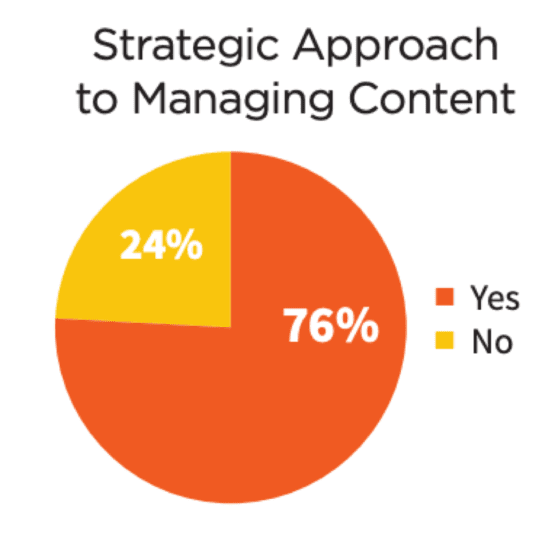
Of those who said that this is the case, 97% said that they were involved in the strategic content management used by their company. This covered a number of areas, with 89% being involved in the creation of content and 84% having a say in the organization’s content marketing strategy, including thought leadership, owned media management and distribution channels.
Other areas of involvement in business’ strategy included the content strategy itself (77%), which includes governance, content management, audits and taxonomies, general marketing (59%), communications (53%) and information technology (10%).
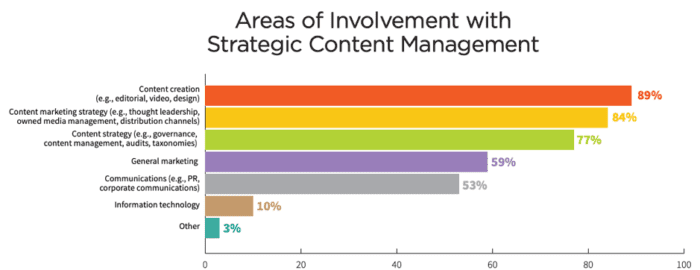
Why don’t organizations take a strategic approach?
Of those whose companies don’t take a strategic approach, the biggest reason for this was leadership. According to 56% or respondents, a strategic approach to content management has not been made a priority by those in charge.
Another reason given by just under half (49%) of respondents is that their organization doesn’t have enough processes in place, with 47% placing the blame in the culture of their company.
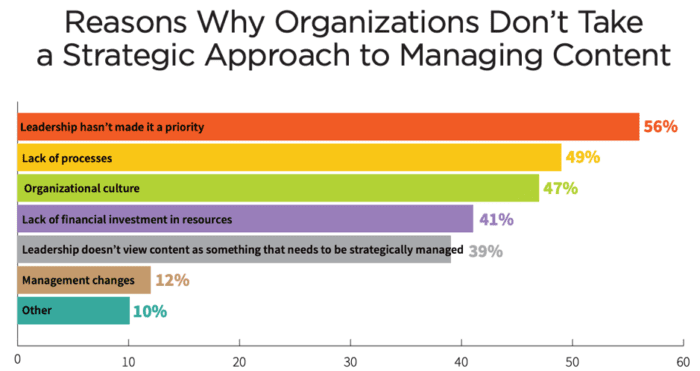
In addition to these reasons, a lack of financial investment in resources (41%) and leadership doesn’t view content as something that needs to be strategically managed (39%) were also cited.
All of these reasons could mean that 24% of organizations not using a strategic approach to content management might be failing to get the most out of content marketing. A strategic approach means that companies can better scale and deliver content, ultimately improving the overall customer experience, which can help improve conversion and keep customers engaged over time.
Documented content management strategies
While 76% or respondents say their organizations take a strategic approach to content marketing management, only 59% have a documented content marketing strategy. This means that 41% of companies could face issues when handing over their strategy to new members of staff, ensuring that the strategy is followed, documenting any changes or assessing what aspects of the strategy are no longer working.
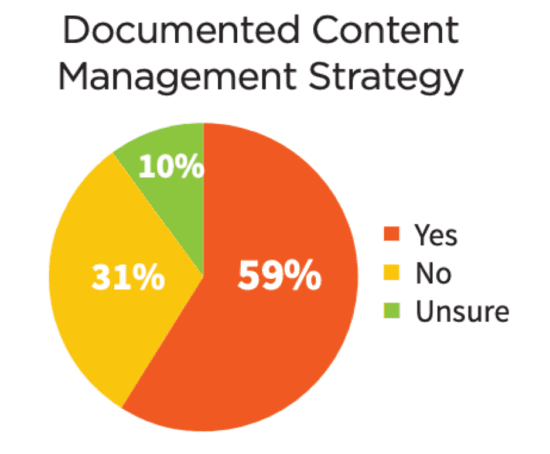
Maintaining an up-to-date content marketing strategy document can ensure that everyone working on the organization’s content is essentially on the same page. This means that all content is being created in-line with the strategy and goals of the company and that all departments are working together.
Of those whose organizations do have a documented strategy, 94% say that it includes the business’ goals and objectives, while 79% state their strategy includes defined roles and responsibilities. Other elements included in strategy documents include measurements and KPs (76%), desired outcomes (72%), defined workflows (71%), timeframes (62%), content governance specifications (59%) and training guidelines (21%).
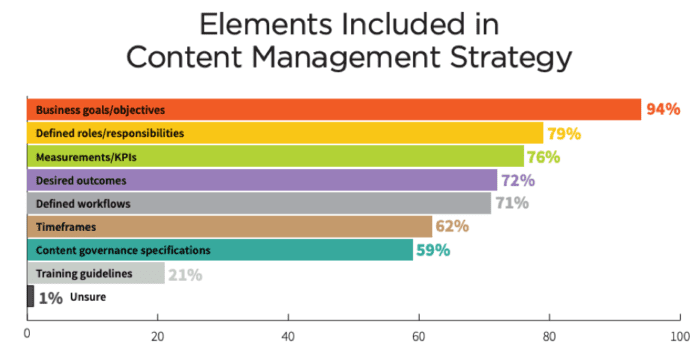
Ideally, all content marketing strategy documents should cover these points in order to ensure they are as informative as possible. After all, there is not much point in including an organization’s goals if your strategy does not state how success is to be measured.
Content audits
Content audits are an important part of a content marketing strategy as they enable a review of all content and ensure that a website is creating the best customer experience. Performing an audit means you are able to ascertain whether your content is effective and reaching your goals, if it offers the best experience, if it is engaging and whether it is aiding in conversion. You can also take a look at what content can be repurposed and updated, saving time as it reduces the need for brand new content to be created.
These benefits are likely why 66% of respondents say their organizations have undertaken a content audit to evaluate their existing content. A further 67% have also undertaken a content inventory to create a list of all current content assets.
Performing both of these tasks ensure you have a thorough understanding of the content on your website and help with the creation of an effect content marketing strategy.
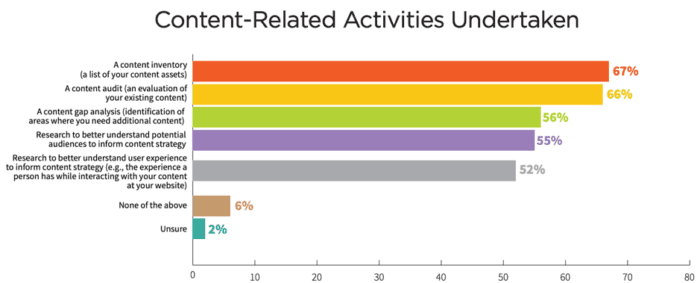
A large number of respondents also said that their organizations have undertaken a content gap analysis (56%) to see where they need additional content, research to understand potential audiences to improve a content strategy (55%) and research to better understand user experience (52%).
Only 6% of respondents who are involved with the strategic management of content marketing in their organizations said they haven’t undertaken any of these activities. This suggests that they may still not be getting the most out of their content strategy due to the lack of research around their audience and understanding of current content.
Development of content marketing
Those respondents whose organizations do take a strategic approach to the management of their content marketing also tend to have a number of content development aids in place compared to those who don’t manage content strategically.
One of the biggest aids used is search engine optimization (SEO) and keyword research, which 77% of those who strategically manage content make use of. In comparison, just 52% of those who don’t have a content management strategy in place use SEO and keyword research to aid in the development of their content marketing.
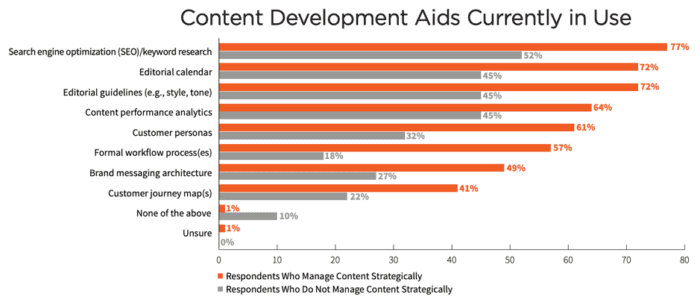
Other content development aids used by both sets of respondents include editorial calendars (72% versus 45%), editorial guidelines (72% versus 45%), content performance analytics (64% versus 45%) and customer personas (61% versus 32%).
One of the biggest difference when it comes to content aids between those who do and those who don’t manage content strategically is formal workflow process. While 57% of strategic content managers have a formal workflow process in place, just 18% of those who don’t strategically manage content. This can mean that the workflow varies from team to team, if not person to person, resulting in work being delivered in different ways and at different times.
Content delivery
Despite such a large proportion of survey respondents managing content strategically, only 10% of those involved in the management believe that their organization delivers the right content to the right person at the right time. Some 39% somewhat agree that their organization is successful in this way, while 20% somewhat disagrees with the statement.
While only 2% strongly disagrees that their audience manages to content delivery right, it is still a fairly small number who thing they really succeed. This throws into question whether their content management strategy is up-to-date and whether they need updating in order to get a better result.
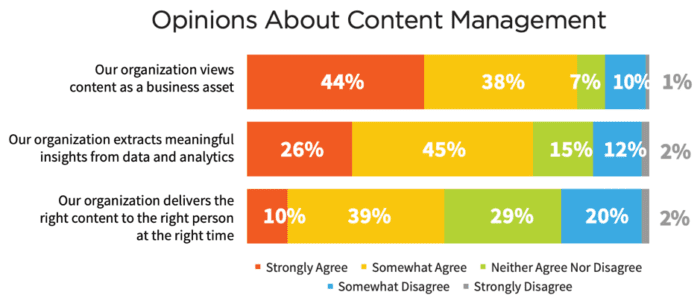
While content may not reach the right people at the right time, 26% of respondents strongly agree that their organization extracts meaningful insights from content marketing data and analytics. This makes sense as just under half (44%) of organizations view content as being a business asset, so they are likely to want to get the most ut of it.
However, these insights still are not being used to ensure the right people are seeing the content at a time in the customer journey that will be most beneficial to them and a company. So while the information is useful, it may not be utilized to fully optimize a strategy.
Final thoughts
Although many companies are strategically managing their content marketing efforts, it doesn’t look like this always pays off. While organizations that do so use more content development aids than those who don’t, they are not always successfully timing their content or targeting it at the right audience.
While having a documented strategy and management process in place are beneficial, it is important that these are regularly reviewed to see if there are any other opportunities to take advantage of or if you need to change up your strategy.
Only by constant measurement and regular auditing can you ensure that your content marketing brings the right results.